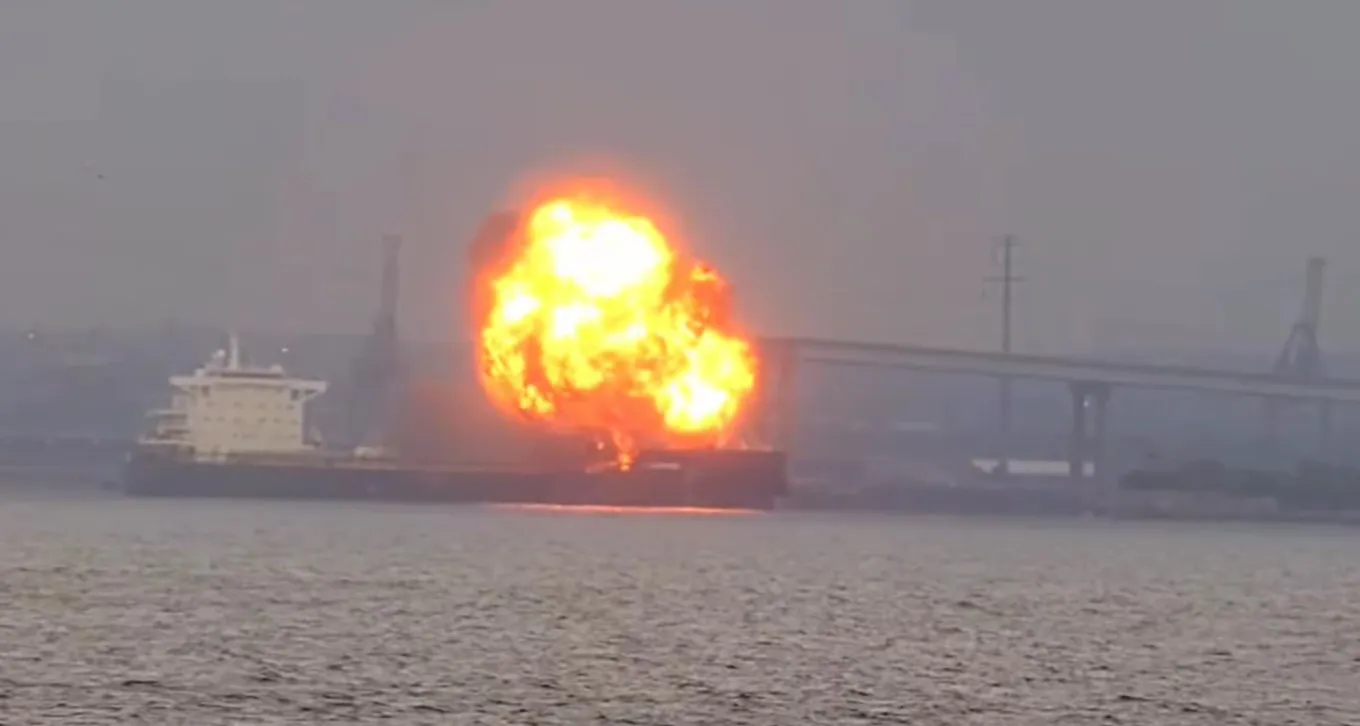Explosion Aboard Coal Carrier Sparks Fire in Baltimore Harbor
Baltimore, MD | An explosion aboard a bulk cargo ship carrying coal sent plumes of thick black smoke into the sky above Baltimore on Monday evening, prompting a swift emergency response from Coast Guard and city fire crews. Authorities confirmed that the blast, which occurred as the vessel transited outbound from Baltimore Harbour, caused visible damage to the ship but miraculously resulted in no injuries among the 23 crew members on board.

The incident took place on the W-Sapphire, a 751-foot bulk carrier, in the Patapsco River near the site of last year’s Francis Scott Key Bridge collapse. The blast was followed by a fire that burned aboard the vessel as it continued moving through the channel.
Coast Guard Petty Officer 1st Class Matthew West said multiple agencies responded quickly to the scene, including Baltimore City firefighters and Coast Guard crews stationed nearby. Despite the challenges of fighting a blaze on a moving vessel, responders were able to extinguish the fire before it spread to the ship’s cargo holds or threatened the safety of the crew.
Video shared on social media showed a stream of dense smoke trailing behind the ship, alarming nearby residents and harbor workers who could see the plume rising into the evening sky.
In a statement late Monday, the Baltimore City Fire Department confirmed that no injuries had been reported and that the fire was under control. “The vessel is showing signs of damage consistent with a fire and explosion,” the statement read. “However, all 23 individuals on board are safe and accounted for.”
Authorities have yet to determine the cause of the explosion. Coast Guard officials said a full investigation is underway, with particular focus on the ship’s coal cargo, which is known to be susceptible to combustion under certain conditions if not properly ventilated.
Coal cargoes can, in rare instances, self-heat and lead to fires deep within ship holds. Experts say explosions linked to coal are less common, but possible if gases generated by the material build up in confined spaces.
“At this point, we are not speculating,” West told reporters. “Our priority is ensuring the safety of the crew, protecting the marine environment, and stabilizing the vessel. Investigators will examine the vessel’s systems, cargo condition, and operational history to determine the sequence of events.”
The explosion occurred in a channel still marked by tragedy from March 2024, when a container ship struck and caused the catastrophic collapse of the Francis Scott Key Bridge, killing six construction workers and disrupting a vital transportation link for the region.
The sight of another large cargo vessel in distress so close to the same location revived unease among residents and raised questions about safety protocols for ships transiting Baltimore’s busy harbor.
For many who witnessed the black smoke near the Patapsco River, the timing and location of the incident was unsettling. “When I saw that smoke, my first thought was, ‘Not again,’” said local resident Carla Simmons, who lives near the harbor. “After the bridge collapse, everyone is still on edge when it comes to ships out there.”
Following the fire’s extinguishment, officials confirmed that the W-Sapphire remained afloat and under control, though it bore visible signs of external damage. No cargo had spilled, and there were no immediate environmental hazards detected in the waterway.
The vessel’s crew, comprised of international seafarers, remained on board Monday night as safety assessments continued. Tugboats were dispatched to assist the ship in securing a stable anchorage for further inspections.
Authorities emphasized that, despite the alarming visuals of smoke rising above the harbor, the situation had been quickly brought under control. “We are grateful there were no injuries,” Baltimore Fire Department officials said. “The coordinated response between city units and Coast Guard crews was critical to preventing escalation.”
The incident is expected to draw attention to broader maritime safety concerns, particularly for bulk carriers transporting combustible cargoes through densely populated waterways.
Baltimore, one of the busiest coal-exporting ports in the United States, handles millions of tons of coal shipments annually. Safety experts note that while incidents are rare, they underscore the importance of strict cargo-handling protocols, regular inspections, and emergency preparedness.
As investigators work to determine the exact cause of Monday’s blast, officials said the priority remains keeping the harbor safe and maintaining the confidence of residents and port workers.
“We will get to the bottom of this,” West said. “For now, what matters most is that no lives were lost and the fire was extinguished swiftly.”
The W-Sapphire will remain under inspection in the Patapsco River as authorities assess the extent of the damage and decide whether it can continue its voyage or must undergo repairs in Baltimore.
Author: shipping inbox
shipping and maritime related web portal









